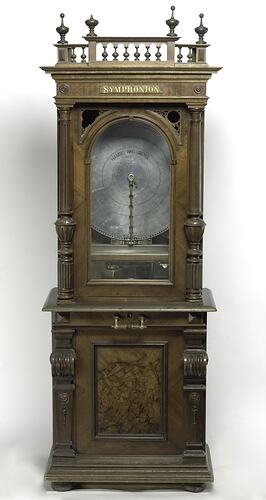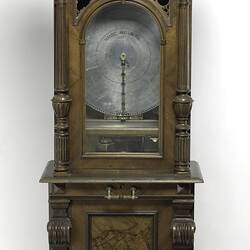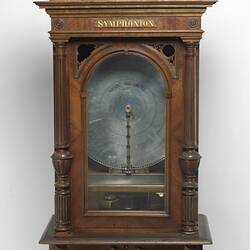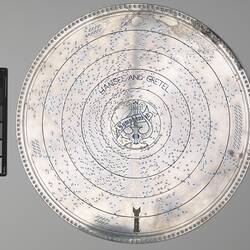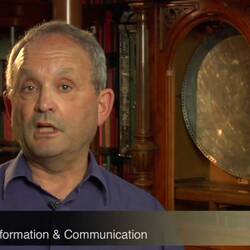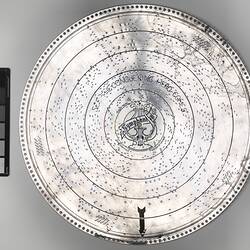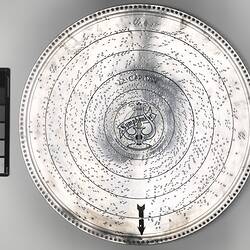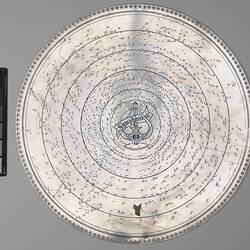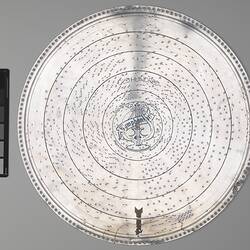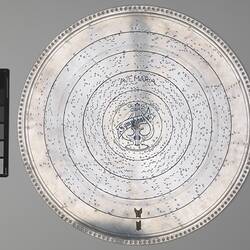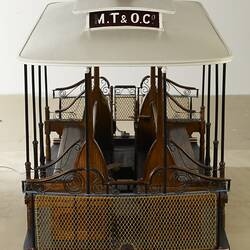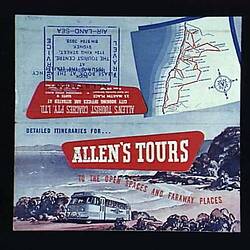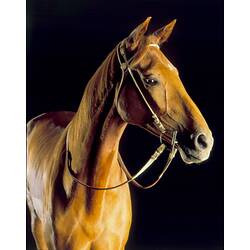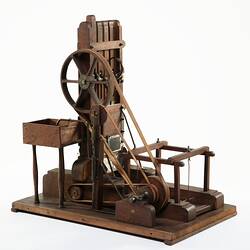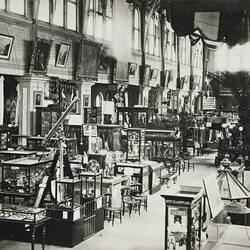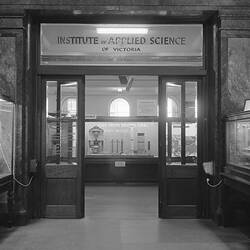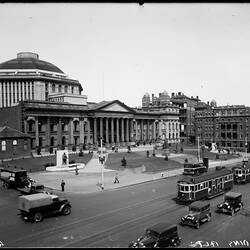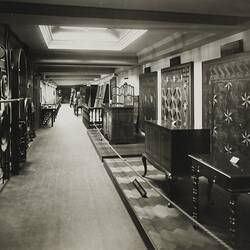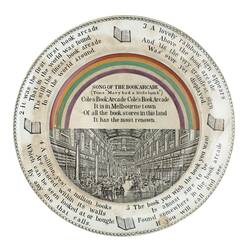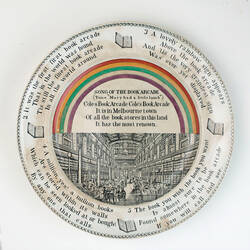Summary
Alternative Names: Polyphon, Great German Music Box
Clockwork mechanical musical box for playing 25 1/4 inch (641 mm) diameter perforated metal discs. This type of instrument was developed by Paul Lochman of Leipzig, Germany, in 1885, and may be regarded as a forerunner of the juke-box. The symphonion and other mechanical music boxes were very popular in Europe and North America in the late 19th and early 20th centuries.
This symphonion was ordered from the Symphonion Company, Germany around 1889, by Charles Bassett, head of the Music Department at Cole's Book Arcade on Little Collins Street, Melbourne. It was originally set up to play once when a penny was dropped into the slot. This activated a clockwork mechanism that rotated a thin 641mm diameter metal disc with small projections on its surface. The projections plucked the teeth of a metal comb, causing music to play. It was modified in the late 1960s for decimal currency with A 240 v electric motor drive. It has now been restored to run by clockwork, and is still in operational condition.
Cole's Book Arcade closed in 1929, and the symphonion was acquired by Museum Victoria shortly afterwards.
Physical Description
Symphonion in tall oak and walnut case with carved and turned ornamentation. Pair of doors on front. Upper door has glass pane, through which is visible a thin perforated 64cm diameter metal disc. Lower door is a cupboard that tilts forward to provide storage for extra discs. It is opened with a metal handle. Carved pillars feature on either side of upper and lower doors. The top of the symphonion case is decorated with rails held by pieces of turned wood. The clockwork mechanism is wound with an external handle inserted into the right side of the case. A slot allows the user to insert a coin to activate the mechanism. Originally one penny was used. The mechanism turns the disc, causing its perforations to pluck against a metal comb, creating music.
Significance
Cole's Book Arcade opened in the Bourke Street Mall in 1883, after earlier operating from other sites. It was a shop like no other, crammed with new and second-hand books and other wares, but with the atmosphere of a circus. Cole enticed customers of all ages with a menagerie and fernery, a band, a clockwork symphonion and other mechanical delights. Readers could sit in comfortable chairs, encouraged by a sign: 'Read for as Long as You Like - Nobody Asked to Buy'. The Arcade's proprietor, Edward William Cole, was optimist and idealist, believing passionately in the power of education and envisaged a world without borders, expounding his views in pamphlets and books. Cole died in 1918, still dreaming of a better future. Cole's Book Arcade, one of the wonders of 'marvellous Melbourne', closed in 1929.
More Information
-
Collection Names
-
Collecting Areas
-
Acquisition Information
Purchase
-
Maker
-
Inventor
Mr Paul Lochman, Germany, 1885
Inventor Paul Lochman is credited with inventing the symphonion but it is not entirely clear whether he manufactured this instrument. There are no obvious maker's markings on the instrument. -
Date Purchased
Cole's Book Arcade, Melbourne, Greater Melbourne, Victoria, Australia, circa 1889
This symphonion was ordered from the Symphonion Company, Germany around 1889, by Charles Bassett, head of the Music Department at Cole's Book Arcade on Little Collins Street, Melbourne. -
Place & Date Used
Cole's Book Arcade, Melbourne, Greater Melbourne, Victoria, Australia, circa 1889-1920s
-
Inscriptions
Painted in gold near top of case: 'SYMPHONION'
-
Classification
Music & musical instruments, Playback devices - mechanical, Perforated disk players
-
Category
-
Discipline
-
Type of item
-
Overall Dimensions
83.4 cm (Width), 48 cm (Depth), 215 cm (Height)
Discs: 62.75 cm
-
References
THE PROVENANCE OF THIS OBJECT IS RECORDED IN "COLE OF THE BOOK ARCADE - A BIOGRAPHY OF E.W. COLE", BY COLE TURNLEY (pp. 100-101 & p.185).
-
Keywords
Advertising, Booksellers, Mechanical Musical Instruments, Music Boxes, Musical Instruments, Retailing
